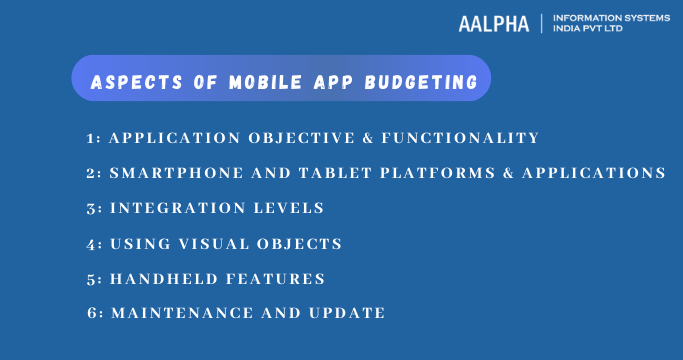There is no way to tell the exact budget until you have a certain model in mind and add functionality. Any considerations affect the budget of developing a smartphone app, as well.
There is no specific amount you must pay for making an app. It relies on all of the variables like the complexity of the app, functionalities including look, development skills, and which technology stack you are using, and where the development team is located, and more.
Developing a mobile application is now critical for your business.
Today, in our day-to-day lives, all is done with smartphones. Now it is also possible to do the grocery shopping, schedule a workout, or book a trip with apps. Many of the mobile applications have not only made things simpler, but they have also provided a straightforward approach to do anything with the quick touch of a button. On the other hand, companies have received an immense amount of new value from applications that can be accessed on a mobile device.
The following aspects regarding budget should be taken into consideration when developing a smartphone app:
-
Application objective & functionality
Since they are so diverse, the primary goal drives the expense of the application. A small calculator is essential for a small company but may not be needed for the global sales team.
Discuss and decide on the following issues with your team:
Will the application be publicly available? and who would use the app? Is this app meant to be for use inside the company? And how can they use it?
What do consumers hope to gain by using the application?
-
Smartphone and tablet platforms and applications
There are a lot of differing mobile device platforms to choose from, including iOS, Android, and Windows Mobile. The main factor to consider is which ones your developers can accept because it will determine the amount of production time and costs. For instance, Android platform heterogeneity (there are more than 20,000 separate devices and screen sizes) makes it more challenging to guarantee an app would perform well on each piece of hardware, while on the iOS, it is just a matter of the iPhone, iPad, iPad mini, and iPod (which has the same size)
Consider the system form as well. Are you only interested in doing business with mobile phones? If we made the software universal, it would need much more development resources.
Lastly, you must choose whether you want to go for a completely sensitive version (which is usually on mobile devices) or a mixed one (hybrid applications that can be distributed through many platforms) (part native and part web app, with one code base, deployed to different platforms). Developing a native app usually costs more but has higher results and more specialized functions as well.
-
Integration levels
Integration levels would almost always cost more to implement but would save you money in the long term, because of time and cost-effectiveness.
Ask yourself the following questions:
Are there any other third-party applications that it must integrate with? For BASF, our app, such as the one we created, does the backend work that was done manually.
How can the material be sourced? Is the material in databases or are additional APIs being created to store it?
Who gets to decide what is on the internet? Are there several parties that have a say in the making of the game? Is there a set process in place for content analysis and content approval?
-
Using visual objects
It happens often when customers choose to incorporate complicated user interface features, and this always results in a better User Experience. Will the app make good use of real-time 3D images, smooth animations, and even more nuanced visuals? You should expect to pay extra.
Any hybrid applications will not be able to take advantage of the hardware-accelerated user interfaces are discussed above.
-
Handheld Features
One of the interesting things about mobile apps is their potential to use your smartphone’s intelligent features. And if you wish to include any functionality like the phone’s GPS, compass, location functionalities (such as iBeacon), and a webcam, there would likely be an expense involved.
-
Maintenance and update
Deploying the mobile apps is the first phase, not the final one. Start with a repair schedule early in the design process and consider how much of it can be budgeted as part of the total expense from the start. Besides, this package should contain new functionality and functionalities. The software keeps evolving. It is necessary to stay current on any OS upgrade (at least once a year). If you are not prepared to upgrade the app regularly, the application may become obsolete. This proposal is part of a broader digital approach that will complement it nicely.
Conclusion
App planning is budgeting for monthly expenditures. The first step is to take a good look at your goals and requirements to identify what you may need to do. Often, consider the solution costs. Secondly, make a spreadsheet of the most favorable rates. After this, talk to the stakeholders. Finally, set a budget and make sure you always adhere to that.
To understand the concept of app development, you must have to know the programming language. Budgeting in the modern world of reality takes a lot of creativity.
When you have determined which mobile app development company in India or the US is suitable for your project, always make sure that you do a detailed feasibility study. Then, you need to have a healthy amount of faith in your estimates to be able to correctly know how much you need to spend for mobile app growth.
If you are planning for mobile app development then feel free to contact us
Also check: mobile app development cost in India





Share This Article:
Written by:
Muzammil K
Muzammil K is the Marketing Manager at Aalpha Information Systems, where he leads marketing efforts to drive business growth. With a passion for marketing strategy and a commitment to results, he's dedicated to helping the company succeed in the ever-changing digital landscape.
Muzammil K is the Marketing Manager at Aalpha Information Systems, where he leads marketing efforts to drive business growth. With a passion for marketing strategy and a commitment to results, he's dedicated to helping the company succeed in the ever-changing digital landscape.